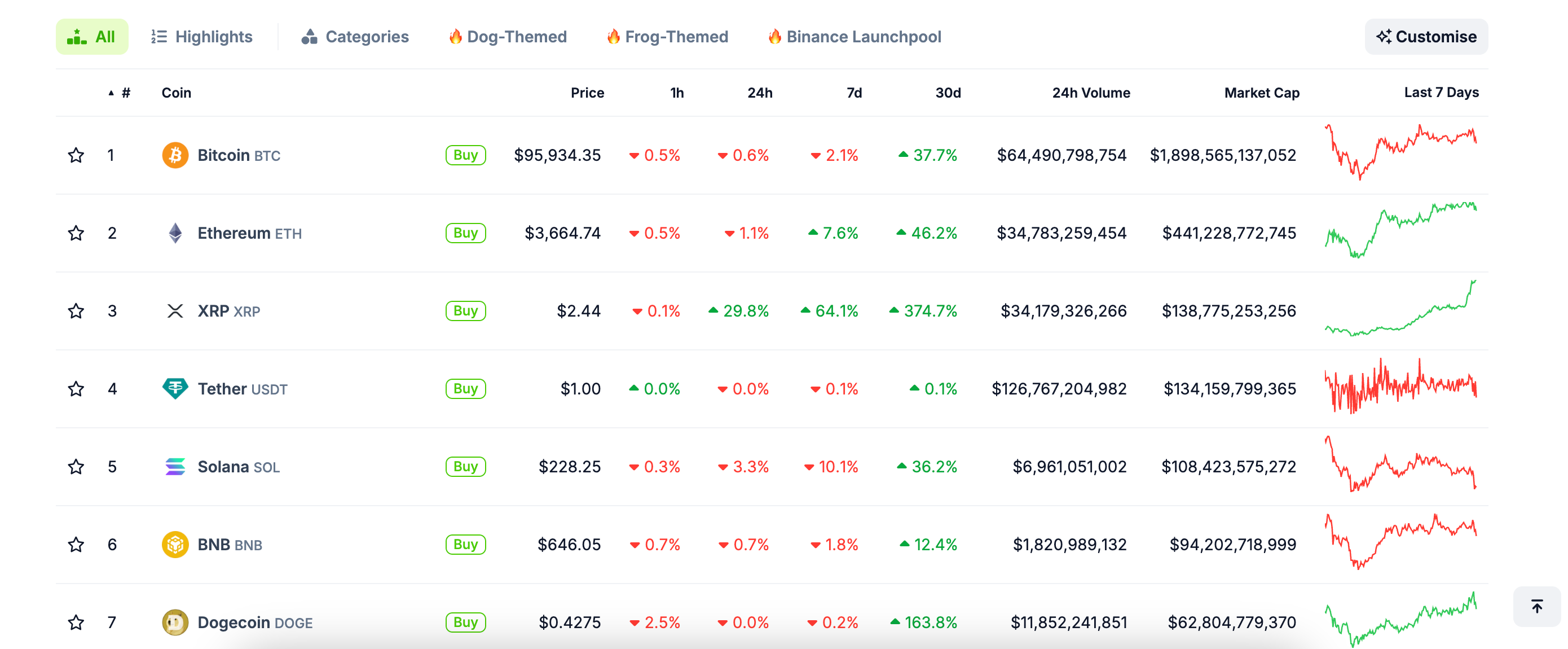Disclaimer: The datasets shared in the following article have been compiled from a set of online resources and do not reflect AMBCrypto’s own research on the subject
At first glance, it would seem like a good thing that Bitcoin is becoming less volatile than stocks. However, cryptocurrency traders warn that in a low-volume setting, that could not be a good thing.
Here’s AMBCrypto’s Price Prediction for Bitcoin [BTC] for 2023-24
According to Noelle Acheson, the creator of the “Crypto is Macro Now” newsletter, the coin’s 30-day realized volatility has “fallen dramatically” recently. According to Acheson’s compilation of Coin Metrics data, it has been hovering above 64% annually for the past month and was at about 52%.
In the meantime, BitVol, a volatility indicator, has “begun to break down,” plunging to close to its lowest levels since the spring, according to Jake Gordon at Bespoke Investment Group. The index, at press time, was hovering at 69, down from over 111 in May.
According to Mike Novogratz, the CEO of cryptocurrency investing firm Galaxy Digital, the gloomy trend may continue for another two to six months. The majority of investors that required fiat have already sold their assets, he claimed, and sellers are severely depleted. However, the Fed’s monetary policy needs to shift to buck the trend.
Top-tier Bitcoin whales are continuing to sell, and they currently have between 100 and 10,000 BTC. Over the course of the previous year, 3.5% of the supply on these crucial addresses was moved to locations having lower impact on future price fluctuations. Just in September, another 0.4% of BTC’s supply was burned. A significant tendency to watch out for in October is the accumulation of potential whales.
Since there is still a dearth of unique BTC traveling from address to address, the NVT signal has given out a bearish signal for the second consecutive month. A change in the same could indicate a bullish trend.
And yet, the crypto has developed into one of the largest assets in the world from being ultimately almost worthless. Bitcoin’s market capitalization peaked even higher than several well-known companies.
One thing that is instantly clear from this data is that Bitcoin’s price cycles are getting shorter. Furthermore, even though the coin frequently loses value, the average price of Bitcoin keeps rising. This indicates a promising pattern for the future.
And despite everyone writing it off, the crypto-sector, including Bitcoin, is renowned for its resilience and capacity for comebacks. For the past eight years, different financial experts have consistently predicted that the Bitcoin bubble will burst “soon.” However, the coin is still in demand and BTC investors make significant returns.
Why these projections matter
The following article will touch upon these projections. With BTC emerging as a strong store of value of late, it is crucial investors are aware of where popular analysts see the cryptocurrency heading over the next decade. These projections, while not an absolute certainty in any way, can help traders and holders make smart decisions.
That’s not all, however. According to CoinGecko, for instance, Bitcoin enjoys a market share of just under 38%. While this figure isn’t as high as it was back in 2017 or even, 2021, it’s a significant share. By extension, what it means is that whatever happens to Bitcoin, the rest of the altcoin market is bound to see a ripple effect. Ergo, even if you’re only into altcoins, what BTC performs will affect you too.
This article will briefly look at the cryptocurrency’s recent market performance, with a special focus on its market cap, volume, and rate of appreciation/depreciation. The same will be expanded upon with the use of datasets such as non-zero addresses, no. of whale transactions, et al. It will conclude by summarizing the projections of the most popular analysts/platforms, while also looking at the Fear & Greed Index to assess the mood of the market.
Bitcoin’s price, volume, and everything in between
At the time of writing, Bitcoin was trading at $19,154 on the price charts, having depreciated by 1.81% over the past day.
Needless to say, BTC’s price movement had an impact on its market cap too. When the crypto’s price hit a short-term peak on 30 July, so did the market capitalization, with the same rising to $469 billion. At press time, it was down to $370 billion. As expected, BTC/USDT was the most popular trading pair on the market, with Binance enjoying a share of over 6.3% for the same.
On 19 September, 620K Bitcoin tokens were added to all exchanges, according to Santiment’s Exchange Inflow Indicator. As a result, there are currently 11,879,200,000 dollars’ worth of Bitcoin available for sale at any time.
The aforementioned may be good news for investors. Especially since many would see this as a good opportunity to buy BTC on the low. In fact, while BTC is still over 69% away from its ATH of over $69,000, there’s a lot of optimism around.
Consider the comments of the legendary Bill Miller, for instance. He was in the news a while back when he claimed,
“Bitcoin’s supply is growing around 2.5 percent a year, and the demand is growing faster than that.”
To Miller, this growth in demand will be accompanied by a corresponding hike in price too, with a target of $100,000 being thrown around by some. In fact, a similar logic was applied by Bloomberg Intelligence when it claimed that the demand and adoption curves pointed to a projection of $100,000 by 2025.
One can argue that over the last few years, much of Bitcoin’s demand and adoption has been driven by its emergence as a store of value. In fact, while quite a few are into it for the tech, many others are into Bitcoin for a good return on their investment. It is in this regard that it’s worth looking at how its ROIs have been. According to Messari, for instance, at the time of writing, BTC was offering negative ROIs of -27% and -41% over a 3-month and a 1-year window, respectively.

Source: Messari
Understandably, the aforementioned datasets are products of how BTC has been doing on the price charts of late. Thanks to its most recent drawdown, its ROIs have been negative. Even so, there are a few factors that seem to underline a bullish turn for the world’s largest cryptocurrency.
For instance, the number of Bitcoin addresses holding 0.1+ coins hit an ATH. Furthermore, the $BTC Percent Supply in Profit (7d MA) just hit a 1-month high of 60.513% too while the aSOPR (7d MA) struck a 3-month high. That’s not all either –
📉 #Bitcoin $BTC Mean Block Size (7d MA) just reached a 1-month low of 1,136,459.461
Previous 1-month low of 1,138,589.185 was observed on 08 October 2022
View metric:https://t.co/GT3eQ9z0Qw pic.twitter.com/gdq4s1dzG0
— glassnode alerts (@glassnodealerts) October 9, 2022
Furthermore, according to IntoTheBlock, 53% of investors recorded profit at BTC’s press time prices. On the contrary, 39% of the holders were in loss.
In addition to this, holder composition by time projected something positive too. A total of 62% held their coins for a period of more than one year, while 32% have held their coins for between one to 12 months.
Proving more support for the holding activity, Glassnode too underlined something similar. BTC’s addresses with a balance of 1 BTC hit a new high.
That’s not all. In fact, despite the bearish outlook, the adoption rate didn’t fail to satisfy the crypto’s credentials.
Talking about adoption, BTC acquiring giants within this game (large holders) too reiterated the trend. For instance, look at MicroStrategy‘s latest spree.
In a prospectus filed with the SEC on 9 September, the company aims to sell up to $500 million in stocks to fund more Bitcoin purchases. Since 2020, MicroStrategy has purchased about 130,000 Bitcoins, worth more than $2 billion, using funds raised from stock and bond offerings.
“We may use the net proceeds from this offering to purchase additional Bitcoin,” the company said in the filing.
Publicly traded software company MicroStrategy (MSTR) is already the single-largest corporate holder of Bitcoin
Now that the background and context is taken care of, what do popular platforms and analysts say about where they see Bitcoin heading in 2025 and 2035? Well, only one way to find out.
Bitcoin Price Prediction 2025
Before we get to predictions, it’s important that one salient feature be identified and highlighted. Predictions vary. From one platform to the other, from one analyst to the other, predictions can be significantly different from each other.
Consider the year 2025, for instance –
According to Changelly, Bitcoin’s average trading price will be as high as $124,508 in 2025, with the platform claiming it might go as high as $137k.
On the contrary, there is reason to believe that the cryptocurrency’s upside won’t be as high. Why? Well, because the crypto is yet to be uniformly supported by global regulatory and legislative regimes. With CBDCs being slowly introduced in many countries, the attitude towards cryptos isn’t exactly positive either.
Finally, the last six months also highlighted the tendency of most retail investors to run with their holdings once the market bloodbath starts.
Another interesting way to look at it is using the growth of tech to highlight how far Bitcoin might go.
Consider the simple case of Google, for instance. Despite recent turmoil, it’s expected to grow exponentially over the next 5 to 10 years. However, it can be argued that this growth will go hand in hand with the growth of Bitcoin and the crypto-market, by extension. This, owing to the correlation between the two.
Bitcoin searches on Google being 7x and 42x higher than the no. of searches for USD and Euro, respectively, is evidence of the same. In fact, according to studies, there has historically been a 91% correlation between BTC prices and Google search volumes.
Bitcoin Price Prediction 2030
For starters, one thing must be made clear. 2025 and 2030 are five years apart. Predictions are difficult to get right as it is. It’s perhaps even more difficult when the timeframe in question is a good 8 years down the line.
Even so, one can see that most people’s predictions for Bitcoin’s 2030 price are on the bullish side. Now, while there is good reason behind such optimism, it’s worth pointing out that these projections don’t account for variables like black swan events.
So, what is everyone saying?
According to Changelly, BTC might peak at around $937k in 2030, with the cryptocurrency trading at an average price of $798k. I
What drives these projections? Well, a couple of reasons. For starters, most are optimistic about the value of the crypto’s scarcity coming into play. Secondly, maximalists envision a future where demand for Bitcoin is endless. Finally, with Bitcoin adoption rising by 113% annually, many believe the same will one day be highlighted by BTC’s price.
There are other projections too, ones even more bullish. According to Parallax Digital’s Robert Breedlove, for instance, BTC will hit $12.5M by 2031. Now, he did say that the cryptocurrency will hit $307k by October 2021. Ergo, there’s good reason why some might not take him seriously.
Bitcoin Price Prediction 2040
2040 is 18 years away. 18 years. Even Bitcoin isn’t 18 yet.
Needless to say, projecting a price level for 2040 is even more difficult, with a whole host of uncertainties around. For the sake of argument, let’s just assume everything else remains the same as it is, how then is BTC likely to do on the charts by 2040?
Well, some have taken a good shot at answering this question.
According to Telegaon, BTC will enjoy an average trading price of $553k, ‘depending on market trend,’ by 2040. It went on to predict,
“Our maximum price prediction for Bitcoin is $618,512.87 in 2040. If the market gets bullish, Bitcoin may surge more than our BTC price forecast in 2040.”
Others have been more vague, with some declaring million-dollar valuations without a definitive timeline for the same. Perhaps, this is for good reason too. After all, blockchain and crypto-trends might change by 2040. Furthermore, who knows what will happen if Bitcoin’s growing adoption doesn’t coincide with a corresponding drive to address its speed and scalability.
Also, for all its growth, it’s difficult to see the crypto outgrow the price dynamics that come with its supply and demand side. In fact, look no further than the last few months when many miners like Riot Blockchain and BitFarms become net sellers of Bitcoin.
Here, it’s worth pointing out that according to a Finder survey, many believe HyperBitcoinization will be upon us by 2040. Maybe even 2035. These events will certainly dictate where BTC will be by 2040.
Conclusion
These projections aren’t set in stone. Not by a long shot. As mentioned, quite a few things might change by the time 2040, 2030, or even 2025 come around. However, if you’re an investor, it’s best to keep an eye out for what these are.
Just consider BTC’s latest price action as an example of the same. Just last week, the crypto was trading close to $24,000 – Optimism was high. At press time, however, the opposite was the feeling around, with many worried the cryptocurrency will now soon go below $20k again.
Now, it’s worth pointing out that there was good reason behind the aforementioned drop in price. According to reports, this was on the back of US Federal Reserve officials reiterating their resolve to keep raising interest rates until inflation is contained. Correspondingly, BTC’s drop in price mimicked the drop seen across equity markets – Unsurprising, especially since there has been a steady correlation between Bitcoin’s price and U.S stocks. In fact, such is the correlation that,
“… marking the strongest correlation since 2010 between digital assets and key equities indices such as the S&P 500 and Nasdaq.”
Such was the scale of the aforementioned fall that over $220M in crypto-positions was liquidated, with Bitcoin accounting for almost half of it, according to CoinGlass.
Now, while that’s what is the case on the price front, it’s worth looking at what’s happening in the background too. Consider this – According to the AASA indicator, while BTC has appreciated of late, the same wasn’t supported by a related hike in active addresses on the network. The same was also recently pointed out by the Founder of LookIntoBitcoin.
According to Tim Rice, CEO of the analytics firm CoinMetrics, more traditional financial institutions have started to enter the cryptocurrency market. Big banks are still waiting for more transparent regulation of the cryptocurrency industry, nevertheless, to lower their risks.
Needless to say, there’s still a lot of optimism around. Consider the opinions of CryptAM’s Niraali Patel, for instance, a panel member for Finder-
“We must think about the long-term implications of Bitcoin and Proof-of-Work cryptocurrencies. Once mined, this will be the next main store of value as gold once was. The halving is set to occur in 2024, and this will, by definition, increase the USD price of Bitcoin by quite a bit. For this reason, I believe this is the time to buy. Once the halving happens, BTC will be worth at least $100,000.”
Read More: ambcrypto.com










 Bitcoin
Bitcoin  Ethereum
Ethereum  Tether
Tether  XRP
XRP  Solana
Solana  Dogecoin
Dogecoin  USDC
USDC  Cardano
Cardano  Lido Staked Ether
Lido Staked Ether  Avalanche
Avalanche  TRON
TRON  Shiba Inu
Shiba Inu  Toncoin
Toncoin  Wrapped stETH
Wrapped stETH  Stellar
Stellar  Wrapped Bitcoin
Wrapped Bitcoin  Polkadot
Polkadot  Chainlink
Chainlink  WETH
WETH  Bitcoin Cash
Bitcoin Cash  Sui
Sui  Hedera
Hedera  Litecoin
Litecoin  Pepe
Pepe  LEO Token
LEO Token  NEAR Protocol
NEAR Protocol  Uniswap
Uniswap  Wrapped eETH
Wrapped eETH  Aptos
Aptos  Internet Computer
Internet Computer  USDS
USDS  Cronos
Cronos  Ethereum Classic
Ethereum Classic  POL (ex-MATIC)
POL (ex-MATIC)  Artificial Superintelligence Alliance
Artificial Superintelligence Alliance  Ethena USDe
Ethena USDe  Bittensor
Bittensor  Render
Render  Filecoin
Filecoin  Algorand
Algorand  Arbitrum
Arbitrum  Dai
Dai  WhiteBIT Coin
WhiteBIT Coin  Aave
Aave  Cosmos Hub
Cosmos Hub  Stacks
Stacks  MANTRA
MANTRA